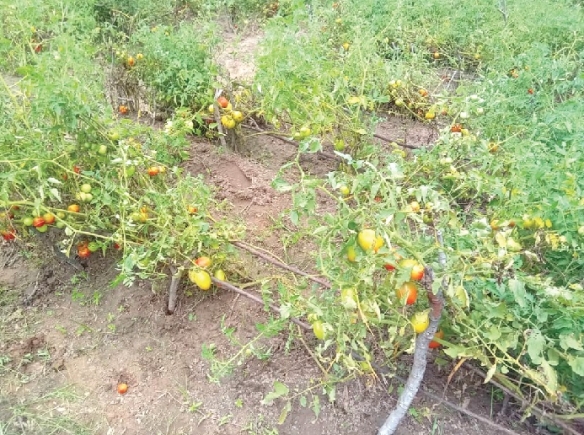CSIR introduces 2 tomato varieties to farmers in Upper East
More than 150 farmers in tomato growing areas in the Upper East Region have been introduced to two new tomato varieties to boost local production.
The beneficiary farmers were drawn from areas such as Tono in the Kassena Nankana Municipality, Vea in the Bongo District and Pwalugu in the Talensi District, where farmers are already into the cultivation of tomatoes for local consumption.
The tomato varieties introduced to the farmers are CRI-Kwabena Kwabena and Kopia, which are early maturing and yield 20 tonnes per hectare as compared to the existing local varieties which yield 7.5 tonnes per hectare.
The introduction of the new varieties formed part of the Vegetable Compact within the Technology for African Agriculture Transfer phase II (TAAT 2) project being implemented by the Council for Scientific and Industrial Research-Crop Research Institute (CSIR-CRI) to support farmers to grow more tomatoes locally to boost production.

The African Development Bank (AfDB), through the World Vegetable Centre (World Veg), an international non-governmental organisation (NGO) into vegetable research, is funding the project which is also benefiting farmers in the Volta and Bono East regions.
Speaking to the media during a field visit to a demonstration farm in Gbeo in the Talensi District to introduce the new varieties to the farmers, a Senior Research Scientist and Tomato breeder, CSIR-CRI, Dr Michael Kwabena Osei, said currently the domestic demand for tomatoes annually was 1.2 million metric tonnes, but only 30 per cent of the national demand was produced locally, compelling the country to import tomatoes from Burkina Faso.
He said in a bid to shore up the local production of tomatoes, CSIR-CRI through the TAAT 2 project introduced the two new varieties, which were unique because the mature early and are high yielding.
He stated that the rationale behind the field’s cultivation by the farmers was to enable them to score the varieties cultivated, saying “once the farmers are satisfied, the seeds and other inputs will be made available to them to go into production.”
Business as usual
He mentioned that if farmers continued to do business as usual in terms of tomato production, it would be very difficult for them to increase production locally, and added that it was often not about the yield but the ability of the farmers to adopt good agronomic practices to get the potential yield.
He stated that although some years ago, Upper East used to grow more tomatoes, the situation changed due to pests and diseases which generally affected production, adding “to remedy it, an integrated pest management approach has been introduced from nursery to planting and harvesting.”
Further, Dr Osei underscored the need for an effective and efficient irrigation system in tomato growing areas, to make water readily available to the farmers since they currently relied largely on rainfall.
Self-sufficiency
The Vegetable (Tomato) Lead, Ministry of Food and Agriculture (MoFA), Esther Agyekum, said the ministry had set a target for the country to achieve self-sufficiency in selected vegetables, including tomatoes, by 2028.
To this end, she indicated that the ministry worked closely with CSIR-CRI towards the release of the two new tomato varieties, stressing “the visit of the farmers was to enable them to witness the performance of the new varieties which had been subjected to conditions in the region.
“I am hoping that more demonstrations and interventions would be supported by the government and other development partners towards achieving the national self-sufficiency target.”
A beneficiary farmer, Timothy Akwovia, on behalf of his colleagues, commended CSIR-CRI for the intervention, saying it would go a long way to increase tomato production as well as enable the farmers to earn more income to better their lives.
Writer’s email: gilbert.agbey@graphic.com.gh
